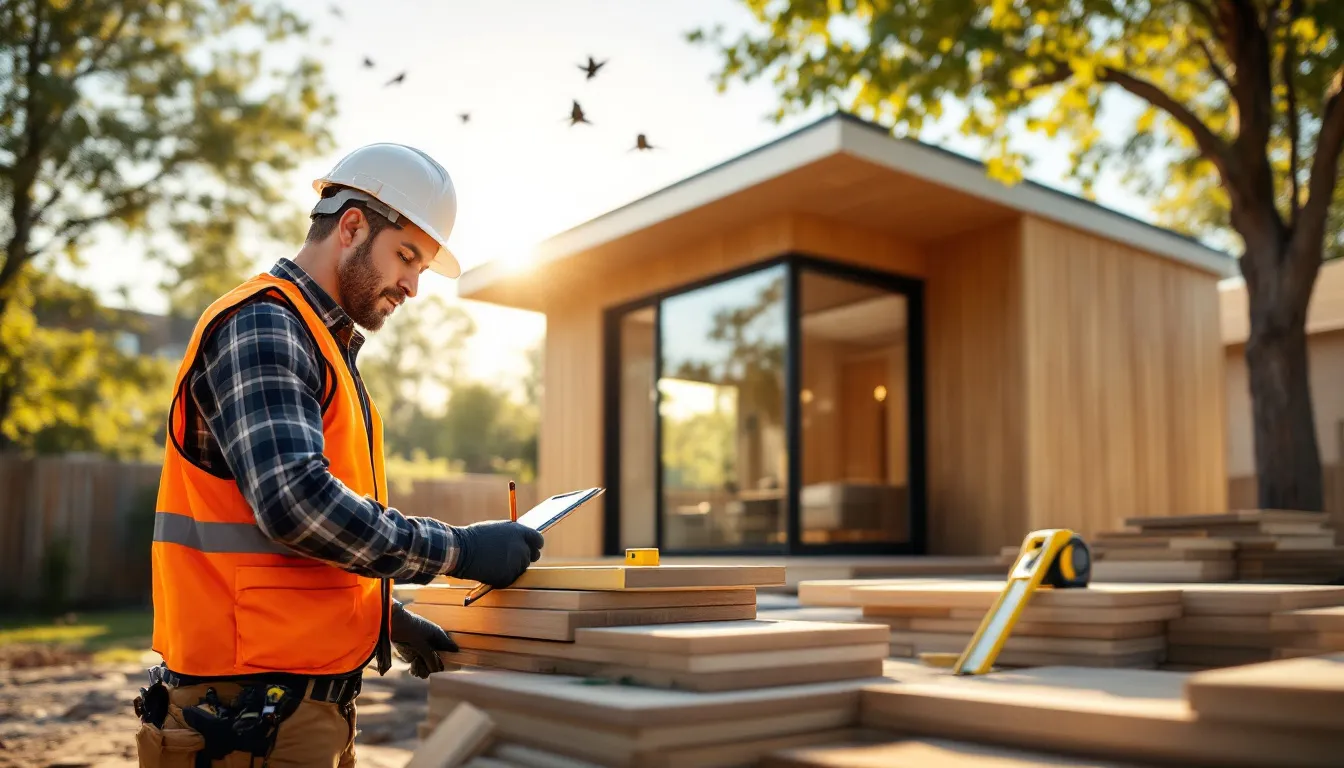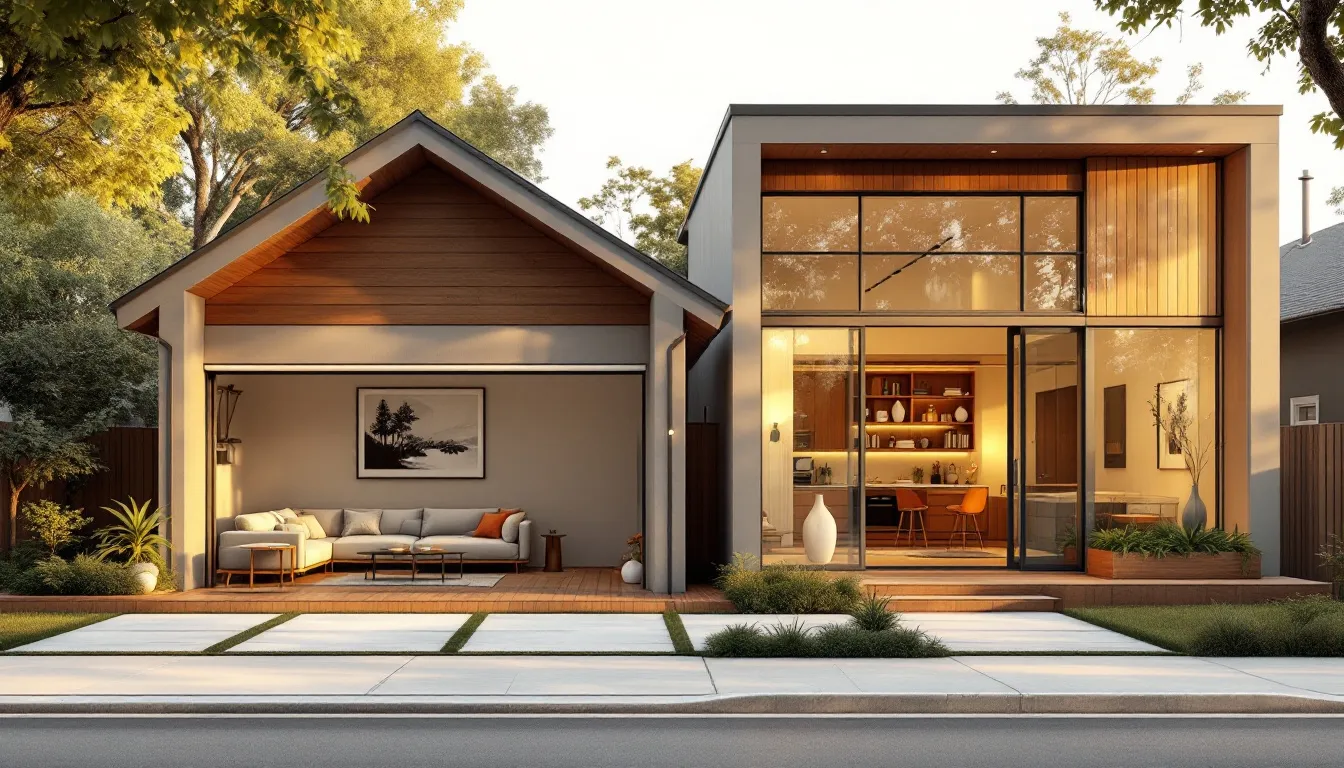Looking to build an ADU? Here's how to pick the right builder:
- Check past ADU projects
- Verify permits and insurance
- Assess project planning skills
- Review financial transparency
- Look for local experience
- Evaluate building standards
Quick tips:
- See completed ADUs in person
- Verify licenses and insurance
- Ask for detailed quotes and clear contracts
- Watch for red flags like super low prices or big upfront payments
- Hold back 10% of project cost until completion
Remember: A good ADU builder knows local rules, communicates well, and has a solid track record. Don't rush your decision - the right builder can make or break your project.
| Factor | Why It Matters |
|---|---|
| Experience | Ensures quality work |
| Licenses/Insurance | Protects you legally |
| Communication | Keeps project on track |
| Local knowledge | Speeds up permits |
| Detailed contracts | Avoids misunderstandings |
| Quality materials | Ensures long-lasting ADU |
Related video from YouTube
What Makes a Good ADU Builder
Building an Accessory Dwelling Unit (ADU) isn't your average construction project. It needs a special touch. So, what sets a great ADU builder apart from the rest? Let's break it down.
Required Skills and Training
A top ADU builder isn't just handy with a hammer. They're a jack-of-all-trades with some serious know-how:
- They've got ADU experience under their belt. We're talking garage conversions, attached units, detached units - the works.
- They're not just builders. They're plumbers, electricians, and HVAC experts rolled into one.
- They can turn a tiny space into a cozy home. It's like magic, but with blueprints.
- They juggle timelines, budgets, and subcontractors like a pro circus performer.
Building Codes and Permits
ADU builders need to be legal eagles too. They should:
- Know ADU rules like the back of their hand
- Keep up with the latest changes in ADU laws
- Navigate the permit maze in their sleep
Take Massachusetts, for example. ADUs there can't be bigger than 900 square feet or more than half the size of the main house. And they've got to be at least 350 square feet. A good builder knows these nitty-gritty details.
ADU Experts vs General Builders
Sure, general contractors are great. But ADU specialists? They're in a league of their own:
| ADU Experts | General Builders |
|---|---|
| ADUs are their bread and butter | They do a bit of everything |
| They know ADU rules inside out | Might need to Google ADU regulations |
| They can make a shoebox feel like a mansion | They know construction, but maybe not space-saving tricks |
| They often handle everything from A to Z | You might need to be more hands-on |
| They breeze through permits | The planning stage might drag on |
Cameron Meredith from ADU West Coast puts it this way:
"Hiring a licensed home building contractor provides assurance that they have met industry standards and possess the requisite skills and knowledge."
So, ADU expert or general builder? It depends on:
- How complex your project is
- What the ADU rules are in your area
- How much you can spend
- How fast you need it done
- How involved you want to be
And remember what Maxable, an ADU development company, says:
"You wouldn't want to hire a handyman to build your ADU. Just because they have experience remodeling a kitchen does not mean they are equipped with the knowledge to construct a whole living unit."
In other words, when it comes to ADUs, expertise matters. Choose wisely!
6 Things to Check When Picking a Builder
Picking the right ADU builder can make or break your project. Here's what you need to look at:
Past ADU Projects
A builder's track record tells you a lot. Check out their:
- Portfolio: Do they have experience with different types of ADUs?
- Local projects: Have they built ADUs in your area?
- Photos: Look at before and after shots to judge their work quality.
- Client feedback: What do past customers say?
Leah Kabli, founder of THE BEST ADU BUILDERS, has some advice:
"Go see completed ADU projects in person. It's the best way to really understand what a builder can do."
Permits and Insurance
Don't skip this part. Make sure your builder has:
- A current license
- General liability and workers' comp insurance
- Bonding
These protect you if something goes wrong. Use the Better Business Bureau or your local city office to double-check these details.
Project Planning Skills
Good builders are good planners. Look for:
- Clear communication
- Realistic timelines
- Smooth coordination with subcontractors
- Smart problem-solving
Ask to see a sample project plan. It'll show you how they organize their work.
Money Matters
You want a builder who's upfront about costs. Look for:
- Detailed quotes with no hidden fees
- Clear payment schedules
- Ideas to save money without cutting corners
Jody Costello, a home renovation planning expert, warns:
"Watch out for vague contracts. You want clear details about the work, responsibilities, payments, and project timeline."
Local Experience
ADU rules can be tricky. Your builder should know:
- Local ADU laws and zoning rules
- City planners and inspectors
- Your neighborhood's style
A builder who knows your area can get permits faster and make sure your ADU fits in.
Building Standards
Quality matters. Ask about:
- Materials: Are they durable and energy-efficient?
- Construction methods: Do they use up-to-date techniques?
- Warranties: What's covered and for how long?
- After-project support: How do they handle issues after they're done?
Find out how they check quality and follow building codes throughout the project.
sbb-itb-4e754d1
How to Review Builders
Finding the right ADU builder can be tricky. But don't sweat it. Here's how to review and pick the best builder for your project.
First Steps to Filter Choices
Start by making a shortlist of potential builders:
- Check licenses: Use your state's contractor license board. In California, there are about 300,000 licensed contractors. Make sure yours is on the list.
- Verify insurance: In California, licensed contractors need at least $1M in general liability insurance and a $15,000 surety bond. Ask for proof.
- Look for ADU experience: ADUs aren't your typical build. Find builders who know their ADU stuff.
- Read reviews: Check online reviews, but don't get hung up on one bad comment. Look for patterns.
What to Ask Builders
Now that you've narrowed it down, it's question time. Here's what to ask:
| Question | Why It Matters |
|---|---|
| Licensed and insured? | Keeps you safe from liability |
| How many ADUs built? | Shows their experience |
| Can I get references? | Lets you check their work |
| Project timeline? | Helps you plan |
| How do you handle permits? | Ensures everything's legal |
| How do you communicate? | Tells you if you'll work well together |
Don't worry about offending them. As Remodel Works says:
"You shouldn't feel bad for asking for any of this information - it's all part of the business, and any good, licensed contractor won't be offended, and will actually respect you for asking and being informed on the process."
Checking Past Work
Don't just take their word for it:
- Call references: Ask about communication, timing, and work quality.
- Visit finished ADUs: See their work up close.
- Check online portfolios: Look for variety and detail in their work.
Leah Kabli from THE BEST ADU BUILDERS says:
"Go see completed ADU projects in person. It's the best way to really understand what a builder can do."
Using Builder Search Tools
Online tools can help you find and vet builders:
- Use ADU-specific directories: Sites like THE BEST ADU BUILDERS focus on ADU contractors.
- Check how they verify builders: Good directories check their listings.
- Submit your project details: Many sites will match you with suitable builders.
- Compare options: Don't go with the first builder you find. Look at a few.
Making Your Choice
You've done your research. Now it's time to pick your ADU builder. Let's break down the final steps.
Looking at Price Quotes
Comparing builder estimates can be tricky. Here's how to make sense of them:
| What to Check | Why It Matters |
|---|---|
| Detailed breakdown | Shows transparency and where your money's going |
| Included vs. excluded items | Some quotes cover more than others |
| Labor and material costs | Helps spot potential issues or overcharging |
| Allowances | Can lead to underestimating costs |
Pro Tip: Ask builders to convert allowances to firm prices. It gives you a clearer picture of the real cost.
Don't just go for the cheapest option. In Austin, Texas, ADUs typically cost $200-275 per square foot. For a 500 sq ft ADU, that's about $125,000 base price. But don't forget extras:
- Utility connections: $2,000
- Utility trenching: $3,000-7,000
- Solar panels (if needed): $12,000-17,000
- Electrical panel upgrades: $2,000
These can push your total to around $144,000. Keep this in mind when comparing quotes.
Warning Signs
Watch out for these red flags:
- Super low prices: If it seems too good to be true, it probably is.
- Big upfront payments: In California, contractors can't ask for more than $1,000 or 10% of the contract price as a deposit.
- Vague details: Clear quotes are a must.
- Poor communication: If they're hard to reach now, it'll be worse during construction.
- Pressure tactics: Good builders give you time to decide.
Lamont Bros. Design & Construction says:
"Your contractor should have a vested interest in seeing your project completed on time and within budget."
Be cautious of cost-plus contracts. They might not give the builder this incentive.
Reading the Contract
Your contract is crucial. Look for:
- Clear scope of work
- Detailed timeline
- Payment schedule tied to project milestones
- Change order process
- Warranties and guarantees
Key Point: Hold back at least 10% of the project cost until completion and final city approval. It keeps the builder motivated to finish strong.
HOMEPLEX advises:
"A good rule of thumb is to reserve at least 10% of the project cost until the project is completed and the city has signed off on the final permits and issued the certificate of occupancy."
A clear contract protects both you and the builder. If they won't provide one, that's a big red flag.
Wrap-Up
Picking the right ADU builder can make or break your project. Here's what you need to keep in mind:
Experience is key. Don't just take a builder's word for it - go see their work in person. Leah Kabli from THE BEST ADU BUILDERS puts it this way:
"Go see completed ADU projects in person. It's the best way to really understand what a builder can do."
Check those credentials. Your builder should be licensed, bonded, and insured. In California, that means at least $1M in general liability insurance and a $15,000 surety bond.
Don't stop at online reviews. Talk to past clients to get the real scoop on a builder's work quality and communication style.
Communication is crucial. You want a builder who explains things clearly and gets back to you quickly.
Contracts matter. Home renovation planning expert Jody Costello warns:
"Watch out for vague contracts. You want clear details about the work, responsibilities, payments, and project timeline."
Local knowledge pays off. Pick a builder who knows your area's ADU rules inside and out. For example, in Austin, Texas, ADUs typically run $200-275 per square foot, plus extra for utilities and upgrades.


